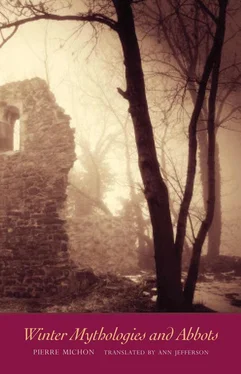The procession of the children of Merovech is now passing through the gates of Paris and across the Berry, the Auvergne, the great unknown territory — the oxen and the horses, the smell of the byre, the hammered iron rings with enormous gemstones, the carts with crimson cushions and creaking wheels whose axles bend and break, the barons, the royal retinue, the bishops, the croziers, the ciboria, the grooms, and the little veiled princess in the heaviest wagon. The slowness, the seasons. Behind the hangings of the large wagon laughter can be heard, and Enimia talking to God, to her goddaughter Galswinthe who laughs the most, and to her angel. God loves her, and she will once again be beautiful; happiness is of this world. The procession slowly crosses the causse, moves down the gash made by the Tarn: the spring at Burle.
The hangings on the large wagon part; the princess steps down. Her bare feet are made of white card like a wasps’ nest. She kneels, she lifts her veil, she takes the cool water in her card-paper hand, she drinks passionately as if she were kissing her angel. For a long time her eyes remain closed, as if she were clasping her angel to herself, then she opens them and looks at her hand: it’s the long, pale hand of a young girl. She throws off her veil and runs on her pink, young girl’s feet. She dances and laughs till she cries. The barons, the bishops, and the grooms look at her. She looks at them with a sort of hunger.
Soon they are ready for the return journey. The hangings on the large wagon are open; the princess sits in it with her hammerediron jewelry and her gown which reveals her arms and her shoulders, her universal hunger. Bishop Sigebert touches her arm as he talks to her, Duke Gontran her hair. She laughs loud and often. It is as if it were her angel touching her through each man. They set off before dawn; six pairs of oxen are placed between the shafts of the large wagon to climb the gash of the Tarn. When they are on the causse and they stop to unharness, it’s daybreak. Enimia, who is looking at the daylight, wants to see it gleaming on her rings. She lowers her eyes to her hand: her rings are sunk in the puffy blisters of a wasps’ nest. All her blood returns to her heart. As her blood stops, she says, “Satan.” In front of her, Duke Gontran, who has seen nothing, is helping the grooms to unharness the oxen: the men’s necks are thick, their hands mean on the withers of the oxen. She looks at her own hand again, and she says. “No, it is Thou, Lord.” She draws the hangings. Behind the hangings, her voice very calmly gives the order to go back down.
She drinks once more, once again her feet are pink, and her hands are hands of love. But she doesn’t throw off her veil. She will keep it on. She is beautiful for God — for no one, perhaps for nothing: to remember, to hope, to talk within herself to that other person who is the angel, to rejoice that she scarcely exists, to tremble, to be long in dying. Life is leprosy. The present hour is leprous. She founds, endows, and rules over Burle Abbey in Gabali country; she buries herself away there. She will never see Soissons again. When she dies, her angel carries her adorably away.
Under the regency of Queen Blanche, around the time when Saint Louis is laying siege to the city of Damietta after setting out on crusade, Bertran de Marseille is bailiff to Guillaume, bishop of Mende, which means that he is the guardian of his seals and his writing desk. He is the steward of written things. He copies written things which prescribe the occurrence of real things between the bishop and the canons, the bishop and the villeins, the bishop and God. Nothing of what he writes causes real things to occur in the life of Bertran de Marseille. This suits him only in part: the flow of written words passes through his hands but does not belong to him, and he would love to divert it at some point, to dam it up, call it his own and be its master before God.
Bishop Guillaume notices his melancholy. And as he is merciful by virtue of his office, he decides to give Bertran mastery and something like suzerainty over a small piece of language. To do so he has recourse to a political pretext: the barons of Cénaret are again contesting the ownership of the spring at Burle by the monks of Sainte-Énimie; the barons of Cénaret are pettifoggers obsessed with legalities, but they have no education: they can neither read nor understand Latin. They haven’t read the Vita sancta Enimia in which the spring at Burle is devolved upon the beyond. In order to nonsuit them, it will be necessary to write the Life in the vulgar tongue and, vulgarly put, to place all bets for the beyond on the spring. Guillaume knows that no one speaks Occitan better than Bertran: he was born and reared in Marseille — not the big, Greek Marseille, but the little Marseille that’s a stone’s throw from Volcégure, on the Causse Méjan. He was suckled on the obscure language of the barons.
The bishop rises at the hour of Matins. He walks through the outer ward and sees the dishes of lentils for the midday meal ready beneath the great crucifix in the refectory. He summons his bailiff to the audience chamber. Before him on the episcopal table there lies the very old manuscript whose parchment is cracking in several places: Vita sancta Enimia . The light from a candle falls across it. Bertran recognizes it at once: he has read it. Both men contemplate the antiquated object with a certain excitement. The bishop’s hand caresses it and spreads it open. He says, “You will rewrite all this in the language that is spoken between Nabrigas and Saint-Pierre-les-Tripiés. The barons must be able to understand it. The jongleurs must be able to understand it and tell it to the villeins in the fairs. Even the villeins must be able to understand some glimmer of it, and laugh or shed tears when they hear it.” Bertran, whose heart is pounding, says that he can do this. The bishop has rolled up the manuscript, and, gripping it tight in his hand, he uses it to emphasize each word as if it were a crozier: “What you write must be absolute like God’s power, clear like the water at Burle, and visible like a tree or a dish of lentils. Make the absolute visible and clear. Describe to perfection a dish of lentils and the appetite you have for it; and without pausing to draw breath, use the same words to describe the appetite that God has for the spring at Burle. The barons do not doubt lentils, and they will not doubt God. They do not doubt the ownership of their porringers, and they will not doubt that God has his porringer at Burle.” He adds, “For those boors to understand you, you will have to speak the truth and yet lie. I shall treat you as if you hadn’t lied, but I cannot grant you absolution. Only the true things that you place at the heart of your lie can absolve you. You will be the master of it before God.”
It is still dark when Bertran goes out. He is full of a taut joy like the bells for Matins. All winter and spring he is busy with written things that cause real things to occur between God and himself. Then he has finished. He brings the bishop a poem of two thousand lines in octosyllables and rhyming couplets written in the vulgar tongue: the Life of Saint Énimie .
It’s summer. The bishop is sitting after dinner under the vine arbor at the bishop’s palace, perhaps with a concubine. He is smiling and cheerful in the lovely light and the lovely shade. Bertran is very serious, intimidated, and proud, without a shadow of melancholy. He looks at his manuscript in the prelate’s hands, between the strawberries and a carafe of ruby-red wine. “Did you put in the dish of lentils?” asks Guillaume maliciously. “Yes, Monseigneur,” says Bertran. He becomes a little flustered and blushes: “And the strawberries too.”
Читать дальше











